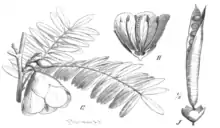| Cadia | |
|---|---|
 | |
| Cadia purpurea | |
| Scientific classification | |
| Kingdom: | Plantae |
| Clade: | Tracheophytes |
| Clade: | Angiosperms |
| Clade: | Eudicots |
| Clade: | Rosids |
| Order: | Fabales |
| Family: | Fabaceae |
| Subfamily: | Faboideae |
| Tribe: | Podalyrieae |
| Genus: | Cadia Forssk. (1775) |
| Species[1][2][3] | |
| |
| Synonyms[1] | |
| |
Cadia is a genus of flowering plants in the family Fabaceae which belongs to the subfamily Faboideae. It includes 8 species native to northeastern Africa, the Arabian Peninsula, and Madagascar.[1]
Unlike most plants in the Faboideae, it has radially symmetrical flowers. In related species with bilateral symmetry, such as those of Lupinus, the dorsal (upper or adaxial) part of the flower expresses one or more genes in the Cycloidea (CYC)/Dichotoma (DICH) family. In Cadia, these genes are expressed throughout the flower. Thus, from a molecular point of view, Cadia is not reversing the ancestral evolution from radial symmetry to bilateral symmetry but obtaining radial symmetry from a new mechanism.[4]
Eight species are accepted:[1]
- Cadia commersoniana Baill. – southwestern Madagascar
- Cadia ellisiana Baker – east-central and eastern Madagascar
- Cadia emarginatior M.Peltier – western Madagascar (Boina Region)
- Cadia multifoliolata Nusb. & Labat – Madagascar
- Cadia pedicellata Baker – central Madagascar
- Cadia pubescens Bojer ex Baker – central and east-central Madagascar
- Cadia purpurea (G. Piccioli) Aiton – Horn of Africa (Ethiopia, Eritrea, and Somalia), Kenya, and Arabian Peninsula (Oman, Saudi Arabia, and Yemen)
- Cadia rubra R.Vig. – western Madagascar (Ankara Plateau)
References
- 1 2 3 4 Cadia Forssk. Plants of the World Online. Retrieved 11 August 2023.
- ↑ "ILDIS LegumeWeb entry for Cadia". International Legume Database & Information Service. Cardiff School of Computer Science & Informatics. Retrieved 26 February 2014.
- ↑ USDA; ARS; National Genetic Resources Program. "GRIN species records of Cadia". Germplasm Resources Information Network—(GRIN) [Online Database]. National Germplasm Resources Laboratory, Beltsville, Maryland. Archived from the original on 24 September 2015. Retrieved 26 February 2014.
- ↑ Citerne HL, Pennington RT, Cronk QC (August 8, 2006), "An apparent reversal in floral symmetry in the legume Cadia is a homeotic transformation", Proc Natl Acad Sci USA, 103 (32): 12017–12020, Bibcode:2006PNAS..10312017C, doi:10.1073/pnas.0600986103, PMC 1567690, PMID 16880394
This article is issued from Wikipedia. The text is licensed under Creative Commons - Attribution - Sharealike. Additional terms may apply for the media files.